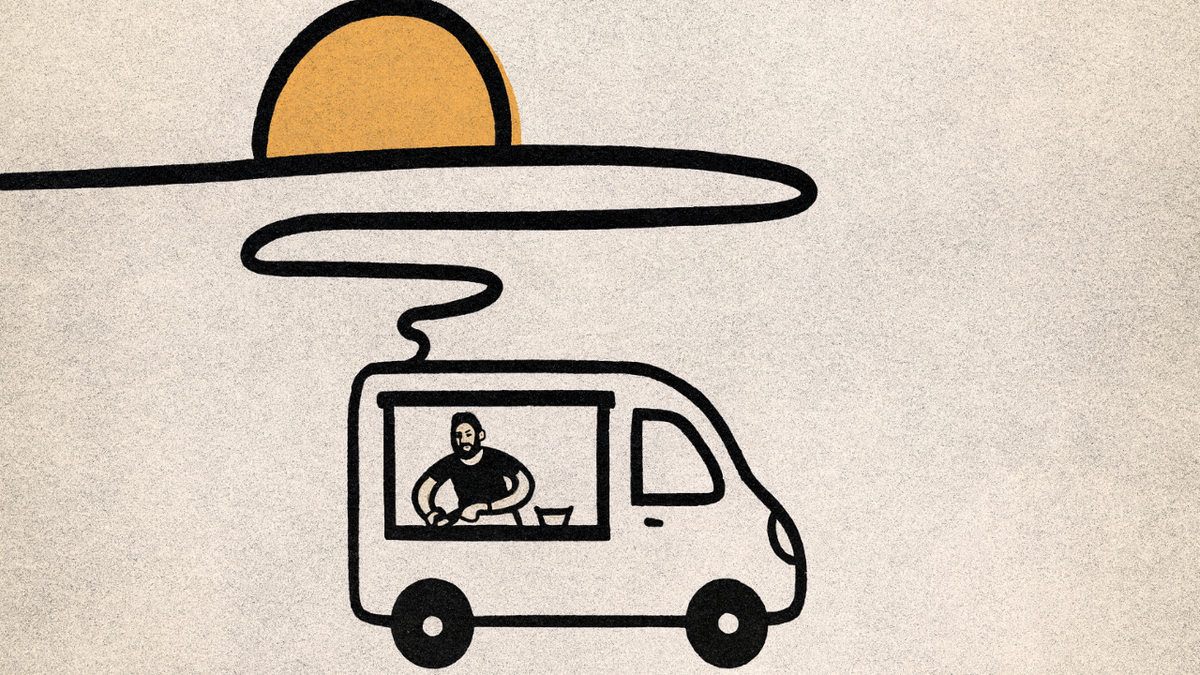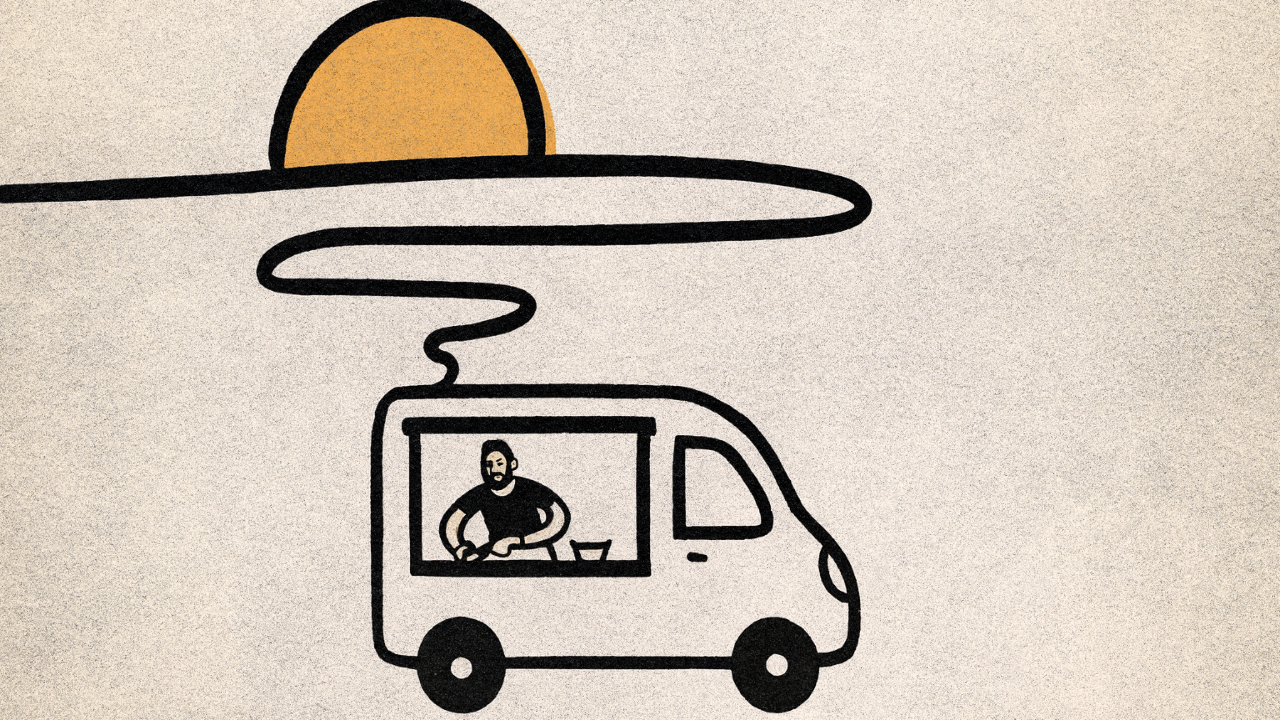Magical Pork
To save his business, a struggling food truck owner needs a real miracle to turn things around.


Quick question. You ever wonder what it feels like to see a miracle happen in real-time? I’m not talking about a weeping statue or a winning lottery ticket. I mean a proper, life-altering, tear-down-the-walls-of-your-reality kind of miracle. The kind that smells like roasted garlic and tastes like crispy pork skin. No? That’s all right. Let me tell you a story, then. Careful though, it might make you hungry.
The name’s Ruben, and I run “Borinquen Bites,” the finest Puerto Rican food truck this side of the Bay Area. And by finest, I mean it’s mine, and I love it more than I love breathing. Maybe even eating. Not to be dramatic but running a food truck is like falling in love with someone who constantly forgets your birthday. It’s joy and frustration, all wrapped up in aluminum foil and handed out the window for 12 bucks a pop.
Except lately, it’s been more frustration than joy. See, the thing about the food truck business is that more often than not, you’re maybe one bad weekend from going out of business. Kaput. Borinquen Bites would take its last breath on the wrong kind of day. At one point, the bank gave me a not-so-complicated ultimatum: come up with the payments, or the truck would be theirs.
The worst part? They didn’t even want the truck. They were gonna sell it for scraps.
And don’t even get me started on food truck theft. My buddy Martín—you know, the guy with the nachos truck in San Jose—he had his truck stolen last week. San Jose is over an hour drive from here in Oakland, but that’s close enough to keep me up at night. This thing’s my baby. I even sleep in the truck sometimes just to make sure it’s safe. Losing it isn’t an option.
Anyway, so this story really begins on a Thursday, which is prime prep day for the Friday lunch rush. The most important two hours of the week, at least for us. Thursdays are when my tiny kitchen—no bigger than the inside of a walk-in closet—turns into a battlefield. It’s me, my cousin Gabi, who’s got the best knife skills in the business, and Hector, our grill guy, who swears he once flipped burgers for Bad Bunny. Sure, pendejo.
But this Thursday wasn’t ordinary. Nah, this was pernil day.
If you don’t know pernil, no problem, let me enlighten you. It’s slow-roasted pork shoulder, marinated in a blend of garlic, oregano, vinegar, and love. The oregano and vinegar are optional, in my opinion, but taking out the garlic and love is an offense punishable by…having to eat that particular pernil.
The crispy, golden skin? That’s called cuerito, and it’s what angels snack on. I swear, if you look close enough, you can see your future in that glistening fat. It’s tradition, celebration, and cholesterol all in one.
We started early, and by early, I mean pretty late at night.
“Ruben,” Gabi said, grumbling, “I’m pretty sure this is a human rights violation, huh? You want crispy pork skin, but what about my skin? I need sleep if we’re working through lunch and dinner tomorrow!”
“Quit whining and peel the garlic,” I shot back, tossing her a massive bundle of cloves. “Pernil takes time, so that’s what we’re giving it! YA TÚ SABES.”
Now, marinating pernil is an art. First, you make the adobo, a blend of garlic, salt, black pepper, oregano, and olive oil. It’s not just seasoning; it’s a declaration. And you gotta make that thing salty like the sea. I smashed the garlic cloves with a mortar and pestle, the sharp, pungent aroma filling the air and then some. I could already taste the finished product in my head. When the garlic was a paste, I mixed in the rest, watching it swirl together into a rich, earthy blend. This wasn’t just cooking, this was communion.
Next up, I made slits in the pork with my knife, careful and precise, each cut ready to hold a pocket of that garlicky magic. The fat cap on this particular shoulder was thin but pristine, the kind that promised golden, crackling perfection. When I pressed the adobo into the meat, it felt…different. The texture, the way it absorbed the marinade—it was like the pernil was talking to me, soaking it all in like a sponge and thanking me for it.
Now, I’d done pernil a hundred times, but something about this one…again, it was different. I felt it when I was massaging the adobo into the meat and wrapping the fat back over the top. Side note: you gotta get personal with your pernil, you know? There’s no room for shyness in boricua cooking. Or eating. You put food in front of me, I’m gonna eat it, no question. Anyway, the garlic didn’t run out like I thought it would halfway. Each clove seemed to multiply in my hands, plump and fragrant. And when I scored the fat cap, the knife moved like it had a mind of its own, carving perfect diamonds into the skin. My old geometry teacher would flip their lid if they saw this.
“You’re getting weirdly intense about that pig, Ruben,” Gabi said, side-eyeing me as she chopped cilantro for the tostones batter.
“Eh, maybe it’s because this pig’s gonna save us,” I replied, without a hint of sarcasm.
Hector was in the corner, prepping a batch of alcapurrias. “It better. I told my girl I’d have her car fixed next month. If this weekend’s a bust, we’re all screwed.”
We prepped late into the night, the air in the truck thick with the smell of garlic, spices, and sizzling oil. I basted the pernil every hour, the juices pooling at the bottom of the pan like liquid gold. And every time I turned it around in the oven? Hot damn, I swear it glowed. Not like a weird, radioactive glow—more like it had been kissed by the sun itself. The skin was crackling perfection, the meat tender and juicy. I could’ve cried, but Hector would’ve roasted me worse than the pork.
Friday morning, I parked the truck on our usual corner for final prep. And my heart stopped. When I checked the oven, I swore I’d messed something up. The temperature gauge was way higher than it should’ve been, but for some impossible reason the pernil wasn’t burnt. Not even close. Instead, the skin was crisping up perfectly, little pockets of golden fat bubbling at the edges.
I wiped my forehead, confused but not about to complain. I just had to focus on getting ready for the lunch rush. Except, it wasn’t just a rush—it was a stampede. Word had gotten out about the pernil, apparently. Maybe it was the Instagram post I’d put up with a slow-mo video of me carving the cuerito, or maybe the smell had drifted on the wind like a siren song, all the way down to Jack London Square. Either way, people showed up in droves.
Only problem? We for sure didn’t have enough for everybody.
By noon, the line stretched down the block. I was slicing pernil as fast as my wrist would let me, piling it onto plates of arroz con gandules and garnishing with a dollop of pink pickled onions. Gabi was on the fryer, cranking out tostones, while Hector kept the coquito flowing. We’d bottled the coconut-rum magic the night before, and it was selling like agua fría on a hot day.
“Ruben! You gonna feed me or what?” Mrs. Romero, one of our regulars, called out as she adjusted her massive sun hat. She had her grandkids with her, two hyperactive twins chasing each other in circles.
“You know I got you, Carmen!” I called back, grinning as I handed over a plate piled high and steaming perfection.
She took one bite and closed her eyes like she’d just seen heaven. “Dios mío, this is better than my own cooking.”
“That’s the goal!” I teased, getting back to the tray. The line wasn’t getting any shorter. In fact, it was getting bigger.
A guy in a suit stepped up next, looking entirely out of place. “I heard about this place on TikTok,” he said, glancing nervously at his phone. “Is it really as good as the hype?”
“Only one way to find out.” I handed him a plate, watching as he took a bite. His eyes widened.
“Holy—this is amazing.” He was already posting it to his Instagram before I could respond.
Gabi leaned over and whispered, “We’re gonna run out, aren’t we?”
Here’s the thing, though: no matter how much pernil I served, the tray never emptied. I’d look down, expecting to see nothing but scraps, and there it was—still full, still steaming, still perfect. At first, I thought I was losing it.
“Gabi,” I hissed, pulling her aside. “Have you been sneaking more pernil into the tray?”
She gave me a look like I’d just insulted her abuela. “¿Estás loco? I’ve been stuck at the fryer all day!”
I checked with Hector, but he just laughed. “What, you think I got a secret stash of pork shoulders in my back pocket? Don’t question it, cuz, just go with it!”
By the time the sun dipped below the horizon, we’d fed half the neighborhood. And still, the pernil didn’t run out. It didn’t even look like it had been touched. The cuerito was just as crispy as when I’d pulled it out of the oven, too. The meat was somehow juicier, the flavor more intense, like every person I served gave it more and more life. And people weren’t just eating—they were connecting with each other. Strangers were swapping stories over plates, their laughter spilling out into the street. Kids who didn’t even speak the same language were sharing bites of arroz con gandules like it was candy. I swear one dude talked about turning his into a taco.
“¡Ruben, mijo!” Mrs. Santiago waved at me from the middle of the line. She was one of my day-ones, back when I could barely afford fresh ingredients. “You better save me some of that pernil, or I’m sending my nietos to raid your truck!”
I laughed, slicing another chunk of pork. “Mrs. Santiago, I got you covered! You think I’d let you walk away hungry? Y TÚ SABES.”
When she got to the front, she took one look at the steaming plate and let out a low whistle. “Smells like my abuela’s kitchen in Ponce.” She pointed at me with her fork. “You better not tell me you stole her recipe!”
“Swear I didn’t,” I said, grinning. “But if it’s that good, maybe I should.”
Post-dinner was normally our downtime, but at 8pm, the truck was still chaos. Orders flew in so fast I stopped trying to memorize faces and just focused on plates. My knife moved on instinct, slicing tender pieces of pernil that fell apart before the blade even hit the cutting board. Hector was yelling out drink orders, Gabi’s fryer was hissing and spitting oil like it was possessed, and the crowd was loud. Someone was playing music from their phone, and every few seconds, I caught snippets of laughter and conversation from people who didn’t seem to care about the wait. The line was wrapping around the block, and I didn’t even have time to feel overwhelmed. All I knew was: slice, plate, repeat.
Then, as if drawn by some invisible force, maybe the god of the bay itself or something, a bunch of other food trucks began to show up. A taco truck with salsas so vibrant they looked painted. A Korean barbecue stand that smelled like heaven on a skewer. A cart selling Ethiopian injera with lentils so spiced they made your tongue dance. What? I had a minute to check it out! Each truck added to the symphony, their owners pulled in by the same magnetic energy that had kept my pernil going all day.
By midnight, the street was alive with music, laughter, and the clatter of forks and bottles. A full-on food truck festival, and it just came outta nowhere. A few old guys I recognized from the local coffee shop showed up with some string lights, and a group of teens helped them set it all up. I even saw that one dude with the suit come back and help them find a way to power the whole thing. And funny enough, somebody else showed up with a speaker playing salsa music loud enough to make your ribs vibrate. Kids were running around with plates of food too big for their hands, and a couple was dancing on the sidewalk like nobody was watching. Smoke from the grills mixed with the scent of spices, and the whole block just felt alive, like it was breathing in time with the beat of the music. Trucks from every corner of the world had joined in, their signs bright and colorful, offering everything from spicy birria to buttery naan.
It wasn’t just a meal—it was a party. A reminder that food has the power to heal, to unite, to bring joy in the face of struggle. My heart swelled just looking over the crowd, a revolution of good times.
Once things finally started to slow down, I spotted two older women sitting at one of the folding tables someone had set up. They were swapping bites off each other’s plates, laughing like old friends. When I stopped by to check on them, one pointed at the other with a fork and said, “Turns out, we grew up in the same barrio in Puerto Rico! Can you believe that?” The other woman nodded, still chewing her arroz con gandules. “I haven’t tasted food like this since I left home. It’s like…I don’t even know. Like it was meant to happen.”
All I could do was laugh. “Maybe a sign to go visit the island again, eh?”
She nodded, mouth full.
As for the pernil? It stayed full until the very last plate was served. When the crowd finally thinned and I closed up the truck, I found the roasting tray empty, save for a single piece of cuerito. I popped it into my mouth, savoring the crunch.
It was quiet now, the kind of quiet that feels full instead of empty. My body ached, my arms were so sore, but I could not stop smiling. The pernil saved more than just my truck that day. I fed the block, but it’s not like I didn’t get anything back for it. And I’ll admit, I didn’t question how the pernil really lasted that long. Some things you just have to take on faith. Only way to make it through, you know?
So, yeah, I’ve seen a miracle. It smelled like garlic, tasted like home, and changed a whole neighborhood. ‘Cause after that Friday, the trucks started coming back like they never left.
Jon Negroni is a Puerto Rican author based in the San Francisco Bay Area. He’s published two books, as well as short stories for IHRAM Press, The Fairy Tale Magazine, and more.
Author’s Note
This story came out of a craving. Not for food, though pernil was definitely on my mind. It came from a hunger for something harder to define: the feeling of being seen, fed, and lifted by a moment that shouldn’t be possible, but guess what it is. A miracle that’s not divine in the religious sense, of course, but communal. And rooted in sweat, seasoning, shared joy, and other secret ingredients.
I wrote this back in January (2025) and wanted to write about hope in a time of near-collapse. About someone doing their best with what they have (garlic, a truck, a cousin with knife skills) and getting more than they bargained for. Not from luck or magic, exactly, but from the way community rises when you nourish it with something that looks and smells like magic. Sometimes, that looks like a neighborhood gathering around a food truck. Sometimes, it’s one perfect bite reminding you where you come from.
For me, I grew up in the states. My parents and most of my siblings were born on the island, though, and we’d visit Puerto Rico pretty much every summer while growing up, months at a time. The benefits of having a mom who’s a teacher. I’d eat some dang good Caribbean food while I was there, but I didn’t fully appreciate it until the day I moved to California, where that kind of cuisine is sparse at best. Eventually, though, some good friends let me know about a food truck in Oakland called Boriqua Kitchen and it was like being in my mom’s kitchen again.
So I wanted to write this story for those fine folks, and also my mom, of course, who taught me how to make pernil with the hope that it might also maybe almost be somewhat close to as good as my Abuela Juanita’s.
Ruben (named after my cousin and uncle) is the kind of character I love most: stubborn, overwhelmed, occasionally ridiculous, and deeply loyal. He doesn’t call himself a miracle worker, but that’s what he becomes. And I think we need stories like his all the time. Not because they make us forget the hard stuff, but because they show us how to survive it. With flavor, with love, with music bumping from someone’s phone at midnight, with some good old fashioned good food.
If this story made you hungry, good. If it made you feel something deeper than that, even better. Y tú sabes.
Thank you for reading Cetera. Subscribe for free to receive new stories every week, right in your inbox. And if you have a few extra seconds, please consider sharing this story with a friend who might like it.




